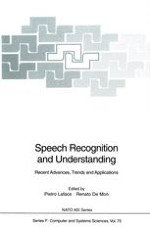
1992 | OriginalPaper | Chapter
Hidden Markov Models and Speaker Adaptation
Authors : Richard Schwartz, Francis Kubala
Published in: Speech Recognition and Understanding
Publisher: Springer Berlin Heidelberg
Included in: Professional Book Archive
Activate our intelligent search to find suitable subject content or patents.
Select sections of text to find matching patents with Artificial Intelligence. powered by
Select sections of text to find additional relevant content using AI-assisted search. powered by
In this chapter we first review the use of Hidden Markov Models for Continuous Speech Recognition. Then we discuss techniques for adapting speech recognizers to the speech of new speakers. In the first section particular attention is paid to the need to incorporate basic speech knowledge within the model. We present the N-Best Paradigm, which provides a simple way of integrating speech recognition with natural language processing. We describe several algorithms for computing the N best sentence hypotheses, and show that one of them is both efficient and empirically accurate. We also introduce the Forward-Backward Search Algorithm, which reduces the computation needed for the N-Best search by an additional factor of 40. We review many different speaker adaptation techniques and distinguish among their salient features. We present a new more practical method for training a speaker-independent system. In particular, we show that it is not necessary to have training speech from a very large number of speakers. Finally, we described a method for adapting a speaker-independent model to a new speaker. This speaker adaptation method results in half the error rate of the unadapted speaker-independent system.